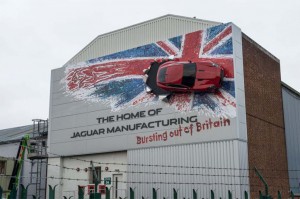
Ralf Speth, CEO of Jaguar-Land Rover, celebrates a win for the Velar as World Car Design of the Year. It was a finalist for the overall World Car of the Year.
It once was said that “the sun never sets on the British empire.” What’s left of that realm could grow even smaller, ironically enough, once the United Kingdom exercises its independence and leaves the European Union.
Negotiations have been going on for months, following the Brexit vote, and among those watching closely to see how future trade relations shape up is Jaguar Land Rover, the British automaker warning that without a favorable deal, it could see its annual costs rise by 1.2 billion pounds, or about $1.6 billion, annually. That would force it to think seriously about moving out of the UK, according to a statement issued by JLR CEO Ralf Speth.
The automaker, he stressed, needs to have “free and frictionless trade with the EU and unrestricted access to the single market” if it is to successfully compete in the global market, Speth said.
JLR is facing the same challenge as other major British companies, the inability to plan for its future while the Brexit talks drag on. “We urgently need greater certainty to continue to invest heavily in the UK and safeguard our suppliers, customers and 40,000 British-based employees,” Speth said in his statement.
(Automakers warn Trump Admin they could cut U.S. plans – and jobs – if import auto tariffs are enacted. Click Here for more.)
It’s been just over two years since British voters declared their desire to quit the European Union in a highly charged referendum. Since then, the two sides have been struggling to work out a plan for future relations that would – at least from the British position – essentially allow trade to continue as it has been since that country joined the EU. But negotiators for the European side have been far less open to essentially allow for business-as-usual while Britain otherwise walks away from other aspects of union membership.
British government ministers are planning to meet on Friday to work out a consensus position on the ongoing EU negotiations, and business minister Greg Clark responded to the JLR statement by saying, “I think it’s right that (the Friday meeting) should be informed by the evidence of businesses large and small.”
If, in fact, business had its say, Britain would likely renounce the results of that referendum. And there has been strong evidence that voters might also be willing to rethink the decision to quit the EU, though there does not appear to be any likelihood that a second vote will be held.
JLR is one of a number of automakers who have spoken out about the impact of Brexit, Nissan, for one, warning it could pare back its large manufacturing operations there. During the first half of this year, investments in British automotive operations fell to around 350 million pounds, or $460 million, down from 675 million pounds a year earlier.
“There is growing frustration in global boardrooms at the slow pace of (Brexit) negotiations,” Mike Hawes, head of the Society of Motor Manufacturers and Traders, told the Reuters news service last month.

JLR has been planning to make major investments as it expands its line-up with vehicles like the next-generation Defender, shown here in concept form.
What is particularly worrisome is that Britain is scheduled to leave the EU, whatever the outcome of the current negotiations, in barely nine months.
(Click Here for a review of Jaguar’s electrifying new battery-SUV, the I-Pace.)
The likelihood that foreign automakers – such as Nissan and Honda – might cut back on the hefty investments they’ve made in Britain over the last quarter century grows as the talks drag on. But Speth’s comments about JLR plans raises the specter that traditionally British brands might scale back, as well, and perhaps leave the country entirely.
“A bad Brexit deal would cost Jaguar Land Rover more than 1.2 billion pounds in profit each year. As a result, we would have to drastically adjust our spending profile; we have spent around 50 billion pounds in the UK in the past five years – with plans for a further 80 billion pounds more in the next five,” Speth said in his statement. “This would be in jeopardy should we be faced with the wrong outcome.”
The uncertain situation has been weighing heavily on JLR’s parent, Indian-based Tata Motors. Its shares have tumbled to their lowest level in more than five years, largely as a result of the Brexit uncertainty. Tata has invested heavily in its British subsidiary since acquiring the two brands from Ford Motor Co. nearly a decade ago, and JLR now accounts for more than three-quarters of its revenues.
“A Brexit which increases bureaucracy, reduces productivity and competitiveness of the UK Industry is in no-one’s interest,” Tata said in its own statement.
(JLR wants to develop autonomous tech capable of off-road driving. Click Here for the story.)


“once the United Kingdom exercises its independence and leaves the United Kingdom.” Leaves the “European Union”
Sigh. Thanks for the catch.
Corrected
“A Brexit which increases bureaucracy, …”.
The EU is the model for bureaucracy.
https://www.gatestoneinstitute.org/4053/eu-regulations